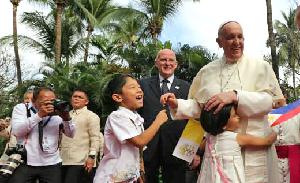Catholic Church, State and Society in the Philippines
More than 300 years of Spanish colonial rule has made the Philippines the Catholic-Christian center of Asia. In no other Asian country has the Catholic Church had such a strong influence, with the country’s population consisting of 80-percent Catholics. In recent years, the relationship between the State and the Church became more difficult. President Benigno Aquino, who has been in office since 2010, is regarded to be a disappointment for Church representatives. Indeed, his fight against corruption is appreciated---however, there were higher expectations regarding his efforts to reduce poverty. This relationship has been extremely tense since the law on the “Responsible Parenthood and Reproductive Health” was enacted in 2013, which supports sexual education and contraception.
In the Philippines, Catholic groups (such as Couples for Christ and El Shaddai) have been increasingly rising---their views and requirements differ from the ones of the Catholic Bishops’ Conference of the Philippines (CBCP). With the emergence of the influential Iglesia ni Cristo, they even have an “opponent” outside of the Catholic spectrum.
Expectations vs Reality
According to the CBCP, they were expecting “directives” from the pope for political decision-makers. However, those who thought that Pope Francis would change visibly the critical relationships between the Church, the State, and society became disillusioned. Even though the Pope declared himself clearly against political corruption and promoted the classical view of the family as expected, still, none of his statements could shift the balance of the fight of public prerogative of interpretation in the Philippines. Although Pope Francis already commented on homosexuality in a liberal way before, he did not mention it in the Philippines.
President Aquino did not make any efforts to improve the relationship between the Church and the State either. In his speech during the Pope’s visit, he accused clearly the putative tolerance of the CBCP regarding the corruption of the former President, Gloria Macapagal Arroyo (until 2010). Even if the President praised the role of the church during the overcoming of the Marcos dictatorship (1972-1986), he still defended the law, the “Responsible Parenthood and Reproductive Health.”
Pope Francis focused on his core issues: in light of the recent events in Paris and the attack on the satire magazine Charlie Hebdo, the Pope stressed the limits of freedom of speech and satire in terms of mocking religion. Still, the Pontiff justified by no means any kind of extremism and violence. Around five-percent of the Philippines adhere to Islam and in the majoritarian Muslim South of Mindanao, an autonomous region Bangsamoro, will be established. Pope Francis promoted with his statement, tolerance towards Islam and any other religion. Particular attention of the media was given to the Pope’s visit in Tacloban, where the heavy damages of typhoon Yolanda in 2013 still have a high impact until today. Pope Francis clarified that the poor, disadvantaged, and less privileged are his priority. Precisely, this priority is associated with his appeal for more integrity and less corruption, which are some of the reasons for the situation of the poor. A newspaper commentator in the Philippine Daily Inquirer interpreted the message of the pope as: “Corruption does not mean withholding resources from the poor, corruption means to steal from the poor.”
Outcomes of the Visit
Even though the infinite euphoria about the Pope’s visit has not faded away yet, it is already possible to evaluate the impact in parts. Pope Francis explained what has to be the top priority for politics, society, and the Church, considering the problems that weaken the Philippines---the reduction of poverty. In comparison, the Philippines, which suffer from corruption and political patronage, is already far behind in the fight against poverty. By now, Laos and Cambodia for instance, achieved more success in Southeast Asia than the Philippines, even though it was one of the most successful economies in Asia a few decades ago. The Pontiff calls for environmental sustainability, the conservation of creation, political integrity, and commitment for the poor. This is no surprise so far. However, especially remarkable is the way in which Pope Francis addresses problems, particularly given the political and economic deficits in the Philippines. Notably, his request to internalize the point of view of the poor gives a new initial point to derive future actions also for policymakers. The humility and integrity Pope Francis exemplifies could be used as an example for political and clerical decision-makers.



